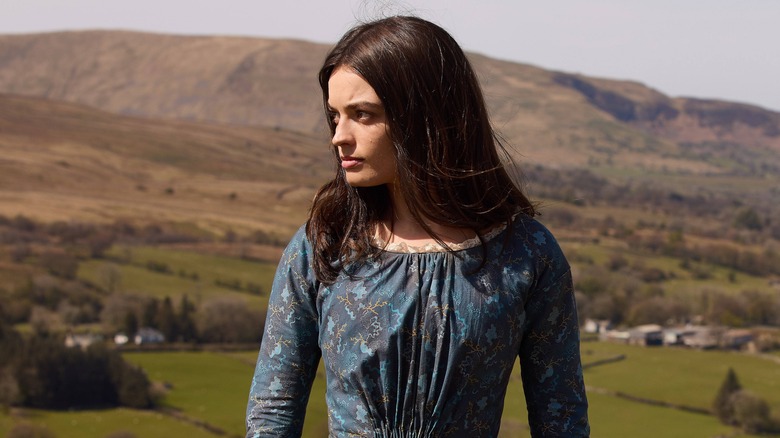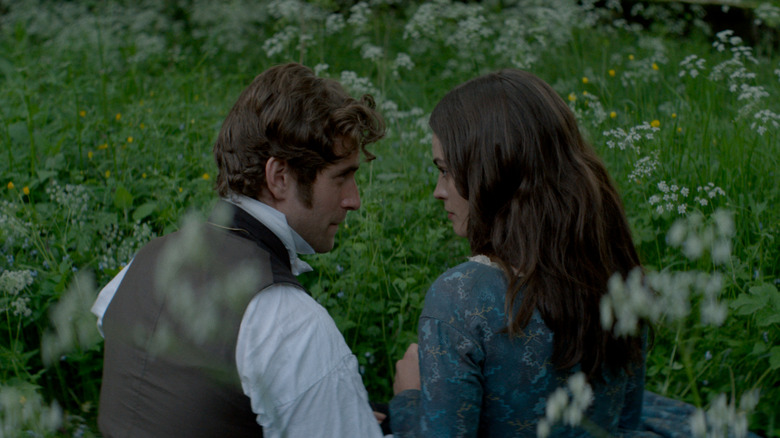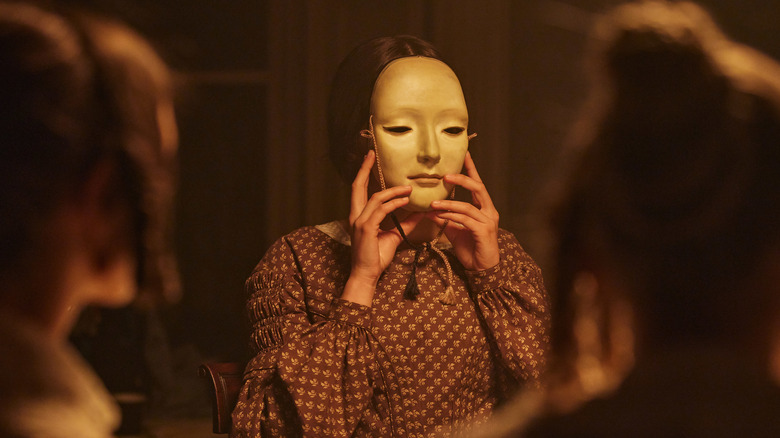Emily Review: Romance In A Gothic Masterpiece
- Gorgeous gothic cinematography
- Clever and imaginative direction from Frances O'Connor
- Masterful performances from the main cast, especially Emma Mackey
- Audiences may need some prior knowledge for maximum impact
Everything about the Brönte siblings seems to embody Gothic romanticism: This was a strange little family of artists growing up in the wilds of Yorkshire, with three sisters and one brother who all died tragically young, one after the other. In some ways, "Emily" is a biopic about the enigmatic Emily Brönte, author of the brooding classic novel "Wuthering Heights." But it's also decidedly not a biopic, taking both biographical and metaphysical liberties with its narrative. By embracing elements of the supernatural, director Frances O'Connor expertly creates a story about Brönte that feels as though it could have been written by the author herself.
Emily (Emma Mackey) has long been considered the peculiar one in her family. Oldest sister Charlotte is the respectable one, Anne is the peacekeeper, Branwell is the rebellious disappointment to their father, and Emily ... well, Emily's just Emily. Prone to bouts of melancholy and supremely uncomfortable with social interactions, she seems best suited to her natural habitat, wandering the moors and dreaming up her stories. Her family expects her to attend the same school as Charlotte, where she will train to become a teacher, which is one of the only realistic career paths for a woman in her social strata. But she seems to start to fade the further away from home she goes. She has a unique connection with her brother Branwell, who comes the closest to understanding her. In a strange way, their relationship seems to mirror Heathcliff and Catherine: They are vaguely incestuous, often toxic, and prone to jealousy, but share a deep bond with one another.
Each member of the Brönte family is perfectly cast, capturing the nuanced relationship dynamics between each of the siblings. Fionn Whitehead as Branwell acquits himself especially well, with his performance demonstrating not just his character's self-destructive tendencies and artistic temperament, but also his deep desire to be loved. Even when Emily verbally tears his work to shreds in a fit of misdirected rage — she essentially calls him a talentless hack — he begs her not to leave. Even the pain of having his dreams crushed could not be worse than being left alone.
A torrid romance
Emily has few social connections outside of her own family and is contented with that — that is until she finds herself fascinated by the new curate, William Weightman, played by Oliver Jackson-Cohen. Their relationship begins inauspiciously: Emily is unimpressed by his sermons, and he regards her as just a sullen French pupil that he has to put up with out of duty. But it quickly grows into something powerful, passionate, and all-consuming.
Emma Mackey is a revelation as Emily, a perfect combination of wildness and vulnerability. She sees the world so differently from anyone else around her, and she suffers for it. Although Mackey has made a name for herself as one of the leads in Netflix's "Sex Education," she deserves for this to be the role that really catapults her to stardom. Surprisingly impressive at her side is Jackson-Cohen, who has rarely been given an opportunity to be this good (despite some memorable performances in "The Haunting" series and "The Invisible Man") but puts in what might be the best performance of his career thus far. Sometimes priggish, sometimes lustful, he is perpetually in conflict between his desires and his sense of morality.
Frances O'Connor's vision
It's writer and director Frances O'Connor, though, who truly makes "Emily" what it is. She possesses such a keen understanding of the Bröntes and is able to use that to create a film that doesn't just tell Emily Brönte's life story with a traditional narrative but captures the essence of her very spirit. There's a sequence where the Bröntes and Weightman are playing with an old mask of their mother's — a harmless game, where they put on the mask in turns and pretend to be someone else. Emily is reluctant at first, but when she eventually wears the mask, she conjures the spirit of her late mother. The scene is eerily macabre and operates just on the cusp of the supernatural world. There's enough plausible deniability that it could be their imaginations running away with them, or Emily taking advantage of a well-timed thunderstorm, but it could also easily be a connection to the beyond. This strange sequence screams gothic literature at its very best, and the fact that O'Connor so seamlessly incorporates it into her work makes it clear that she understands what makes Emily Brönte's writing so powerful.
With gorgeous, haunting vistas of the rugged northern English landscape, "Emily" features the type of windswept isolation that defined all of the Bröntes' work, but especially Emily herself. The lead actors all put in powerful performances that blend with one another perfectly, creating a textured, deeply nuanced vision of a household as loving as it is often conflict. Emma Mackey is a clear standout in an incredibly demanding role, and together with O'Connor, puts together a dynamic, intriguing character study of an author who has so often been defined solely by her creative works.
"Emily" is now available in select theaters.


